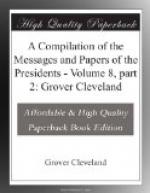If the public homage of a people can ever be worthy the favorable regard of the Holy and Omniscient Being to whom it is addressed, it must be that in which those who join in it are guided only by their free choice, by the impulse of their hearts and the dictates of their consciences; and such a spectacle must be interesting to all Christian nations as proving that religion, that gift of Heaven for the good of man, freed from all coercive edicts, from that unhallowed connection with the powers of this world which corrupts religion into an instrument or an usurper of the policy of the state, and making no appeal but to reason, to the heart, and to the conscience, can spread its benign influence everywhere and can attract to the divine altar those freewill offerings of humble supplication, thanksgiving, and praise which alone can be acceptable to Him whom no hypocrisy can deceive and no forced sacrifices propitiate.
Upon these principles and with these views the good people of the United States are invited, in conformity with the resolution aforesaid, to dedicate the day above named to the religious solemnities therein recommended.
[SEAL.]
Given at Washington, this 23d day of July, A.D. 1813.
JAMES MADISON.
FIFTH ANNUAL MESSAGE.
WASHINGTON, December 7, 1813.
Fellow Citizens of the Senate and of the House of Representatives:
In meeting you at the present interesting conjuncture it would have been highly satisfactory if I could have communicated a favorable result to the mission charged with negotiations for restoring peace. It was a just expectation, from the respect due to the distinguished Sovereign who had invited them by his offer of mediation, from the readiness with which the invitation was accepted on the part of the United States, and from the pledge to be found in an act of their Legislature for the liberality which their plenipotentiaries would carry into the negotiations, that no time would be lost by the British Government in embracing the experiment for hastening a stop to the effusion of blood. A prompt and cordial acceptance of the mediation on that side was the less to be doubted, as it was of a nature not to submit rights or pretensions on either side to the decision of an umpire, but to afford merely an opportunity, honorable and desirable to both, for discussing and, if possible, adjusting them for the interest of both.
The British cabinet, either mistaking our desire of peace for a dread of British power or misled by other fallacious calculations, has disappointed this reasonable anticipation. No communications from our envoys having reached us, no information on the subject has been received from that source; but it is known that the mediation was declined in the first instance, and there is no evidence, notwithstanding the lapse of time, that a change of disposition in the British councils has taken place or is to be expected.




